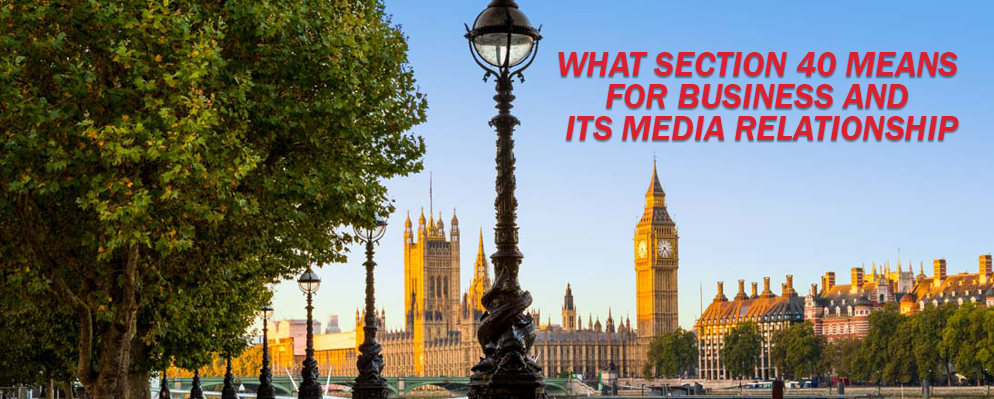What Section 40 means for business and its media relationship
Article Date | 12 April, 2017
What Section 40 means for business and its media relationship
By Ian Valentine and Kunal Chan Mehta
No one can deny the power of the media. It can make or break you or your organisation within moments. However, in the wake of the Leveson inquiry, freedom of the press is facing its greatest threat in over 300 years.
Post-Leveson, the government is considering implementing the controversial, and until now dormant, Section 40 of the Crime and Courts Act 2013. If brought into force, this would allow news media publishers – who are members of an ‘approved’ press scheme – to be exempt from paying the legal costs for opponents, unless it can be proved that the dispute could not have been resolved by the scheme’s own complaints procedures.
More controversial still, in such circumstances a publisher who is not a member of the press scheme will be made to pay the other parties’ legal costs. This exemption and penalty would each apply regardless of whether the publisher lost or won the case, and, more worryingly, regardless of the truth of the alleged libel.
The aim of Section 40 is clearly to create a stimulus for publishers to join, and the public to appeal to, an ‘approved regulator’. However, such a regulator is required by the definition in Section 42(2) to hold or be recognised by a body holding a Royal Charter. As noted by the Privy Council (who are responsible for the grant of such charters) grant of Royal Charter ‘means a significant degree of Government regulation of the affairs of the body’, so an approved regulator could never be truly independent of government influence. To date, there is only one regulator that meets these requirements – Impress.
The requirement to be part of an approved regulator that is subject to government regulation is therefore unnervingly close to state licensing and censorship of newspapers – a requirement rightly abandoned in the UK as undemocratic and open to abuse in 1695. The example of the Trump administration’s treatment of even established and influential members of the ‘mainstream media’ such as the BBC in the US, and the moral panic over ‘fake news’, has the media community understandably concerned about the prospect of greater government influence over what news they can and cannot publish.
Aside from the spectre of state censorship, wider press freedom and diversity is seriously threatened by the implementation of this Section. In the UK currently just three companies – Sun and Times owner News UK, Daily Mail publisher DMGT, and Daily Mirror owner Trinity Mirror – control 71% of the national newspaper market. This media monopoly is only likely to get worse, as smaller newspapers and commercial blogs are priced out of the news market by the cost of regulation and compliance, or are bankrupted by the cost of defending even ill-founded allegations of libel or harassment. This means journalism itself is at risk of becoming risk-averse – along with the marketing, advertising and public relations industries who rely on it. The news media industry as a whole will be forced to think twice before writing critically about any individual or organisation – however warranted the criticism.
So what does this mean for the higher education sector? While academic journals are mostly exempt from the requirement for approved regulation, as are lone bloggers, the unclear definition of a ‘publisher’ in Section 41 and Schedule 15 of the Act could potentially also include privately owned ‘alternative provider’ colleges, and official staff and lecturer blogs -like this one – with a circulation outside of the college itself, and even student produced college newspapers. Given that students and academics are often very politically active, it is very concerning that their scope for fair commentary and investigative journalism could also be restricted by the risk of frivolous litigation by people who have been merely offended, rather than libelled.
Ask yourself the following: is this simply bad law or something much needed to repair the broken trust with British media?
Ian Valentine is a Fellow of CILEx and Head of Legal Services at LSST; and Kunal Chan Mehta is a senior lecturer and marketing consultant at LSST




